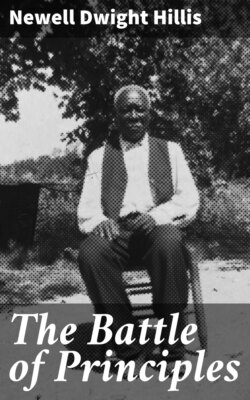The Battle of Principles

Реклама. ООО «ЛитРес», ИНН: 7719571260.
Оглавление
Newell Dwight Hillis. The Battle of Principles
The Battle of Principles
Table of Contents
Foreword
I
RISE OF AMERICAN SLAVERY: GROWTH OF THE TRAFFIC
II
WEBSTER AND CALHOUN: THE BATTLE LINE IN ARRAY
III
GARRISON AND PHILLIPS: ANTI-SLAVERY AGITATION
IV
CHARLES SUMNER: THE APPEAL TO EDUCATED MEN
V
HORACE GREELEY: THE APPEAL TO THE COMMON PEOPLE
VI
HARRIET BEECHER STOWE; JOHN BROWN: THE CONFLICT PRECIPITATED
VII
LINCOLN AND DOUGLAS: INFLUENCE OF THE GREAT DEBATE
VIII
REASONS FOR SECESSION: SOUTHERN LEADERS
IX
HENRY WARD BEECHER: THE APPEAL TO ENGLAND
X
HEROES OF BATTLE: AMERICAN SOLDIERS AND SAILORS
XI
THE LIFE OF THE PEOPLE AT HOME WHO SUPPORTED THE SOLDIERS AT THE FRONT
XII
ABRAHAM LINCOLN: THE MARTYRED PRESIDENT
Index
FOOTNOTES:
Отрывок из книги
Newell Dwight Hillis
A Study of the Heroism and Eloquence of the Anti-Slavery Conflict
.....
An examination of the influence of slavery upon the poorer whites shows that two-thirds of the white population suffered hardly less than did the coloured people. The slaveholding class formed an aristocracy, who dominated and ruled as lords. When the war broke out, there were about four hundred thousand slave-holders, and nine and a half million people. But of these four hundred thousand slave-holders, only about eight thousand owned more than fifty slaves each, and it was this mere handful who lived in splendid homes, surrounded with luxury, beauty, and refinement. Travellers who have thrown the veil of romance and enchantment about the Southern home, with a great house embowered in magnolia trees, its rooms stored with art treasures, its walls lined with marbles and bronzes, and its banqueting room at night crowded with beautiful women and handsome men—these travellers speak of what was as a matter of fact exceptional. We must remember that these men represented a small aristocracy; that their mode of life, so charmingly pictured by many accomplished writers, was the life of a select group, and that the great slave plantations numbered not more than eight thousand in that vast area.
From the hour of the organization of the Abolition Society, these Southern planters assumed an aggressive position. Their editors, politicians and lawyers began to publish briefs, in support of the peculiar institution. The usual argument began with ridicule of Thomas Jefferson's famous statement that all men are born equal. The second argument was an economic one, based on the value of the slaves. Three million slaves would average a value of five hundred dollars each, and this meant a billion five hundred millions of property, that had to be considered as so much property in ships, factories, engines, reapers, pastures, meadows, herds and flocks. All planters invoked the words of Moses, permitting the Hebrews to hold slaves, and therefore exhibiting slavery as a divine institution. Statesmen justified the Fugitive Slave Law by triumphantly quoting Paul's letter, sending Onesimus back to his rich master, Philemon. Jefferson Davis rested his argument upon the curse that God pronounced upon Canaan, and asserted that slavery was established by a decree of Almighty God and that through the portal of slavery alone the descendant of the graceless son of Noah entered the temple of civilization. Once a year the Southern minister preached from the text, "Cursed be Canaan, the son of Ham. A servant of servants shall he be unto his brethren."
.....